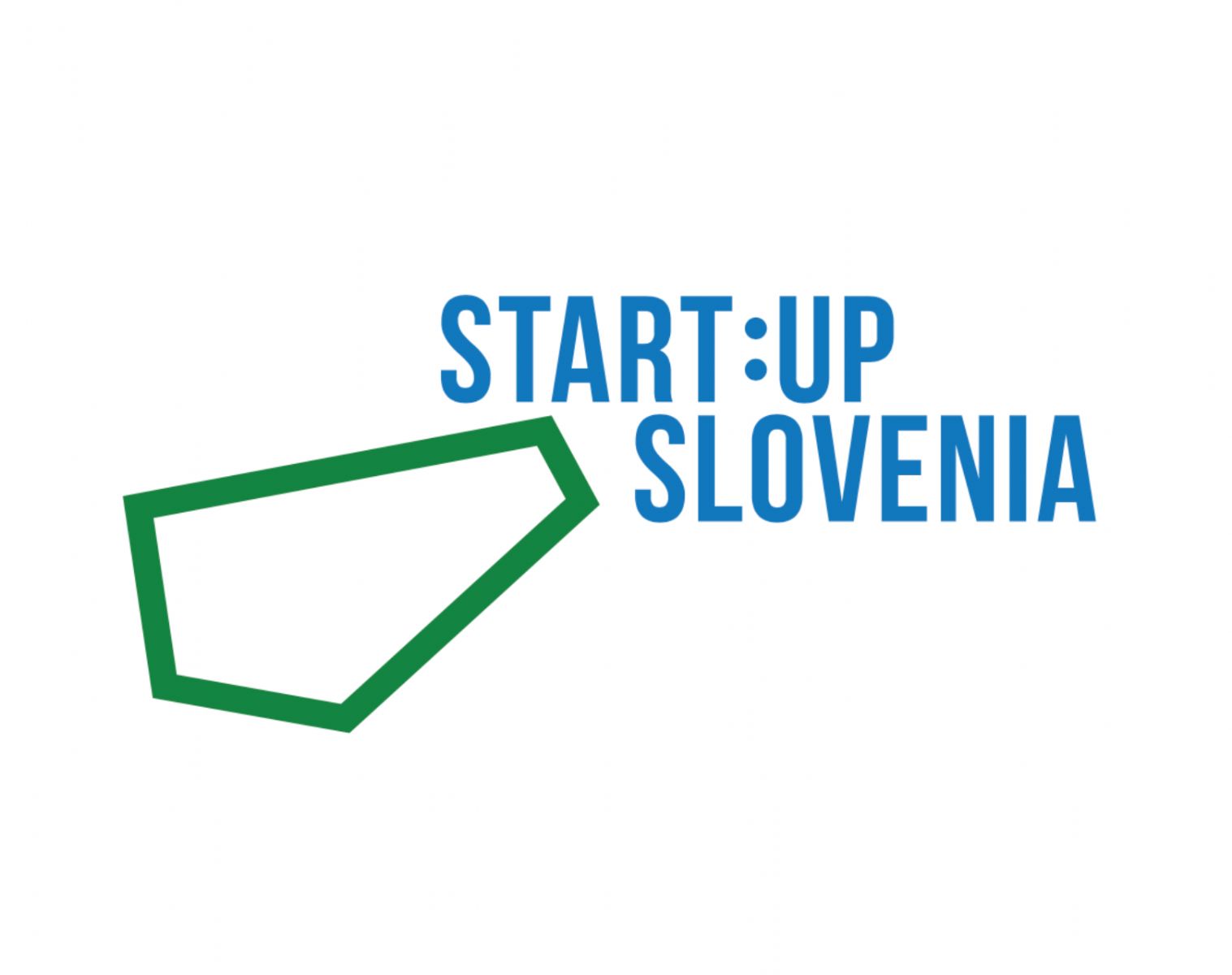Startups and Scaleups are increasingly at the forefront of mainstream economic news and have also gained more attention from government decision-makers. It is an undeniable fact that never before in history have new companies become unicorns and overtaken established companies in such a short space of time. To keep up with this global pace, the EU needs to become a more competitive business environment, as was debated at this year's Next Round investment conference, which also hosted Innovation Summit Slovenia. We had the opportunity to learn about the "Startup & Scaleup Traffic Light", which was developed by the Ministry of Economic Development and Technology and the Slovene Enterprise Fund in cooperation with national and international experts. It sets out measures for startup and scaleup companies at the European level and at the same time represents the basis for the renewal of the Action Plan "Slovenia, the Land of Startups", which addresses key challenges and solutions in the Slovenian startup ecosystem in the most important areas and builds on it with the challenges of scaleup companies. One of the key measures is the limited access to venture capital, which the Slovene Enterprise Fund, the main organiser of the Next Round conference, will try to alleviate with a new 70 million euro fund in cooperation with the EIF.
Europe has made accelerating the creation of unicorns one of its top priorities
Europe and Slovenia need to accelerate the emergence of unicorns, which are synonymous with a well-functioning startup and scaleup ecosystem! According to the “Action Plan to Make Europe the new Global Powerhouse for Startups“, we currently have 80,000 startups in Europe, 51 of which are unicorns (private companies with a value of more than $1 billion), and only 7 of them have kept their EU headquarters after the investment, while most of the rest have moved to the UK or the US. In the US, 67 new unicorns were created in the same period. Some countries in the EU do deviate positively from the average, with Estonia standing out in particular, with 7 unicorns, by far the highest average per capita. If Slovenia were to follow suit, it would have at least 10 (currently 1, and it is based abroad), and Germany at least 400. This is, of course, not good news. But it is positive that Europe has united behind the need to act and has made improving the startup and scaleup ecosystem a top priority. This was confirmed at the event by Mariya Gabriel, European Commissioner for Innovation, who pointed out that: "Our main objective is to support startups and scaleups through an innovation system that provides everything they need." She added:
“Innovation needs to be encouraged and supported in Europe. It is innovation that will drive economic growth and help us make the transition to a digital, inclusive and green society. We need to make sure that we create an environment where innovation can thrive as the cornerstone of an economy that works for everyone and leaves no one behind."
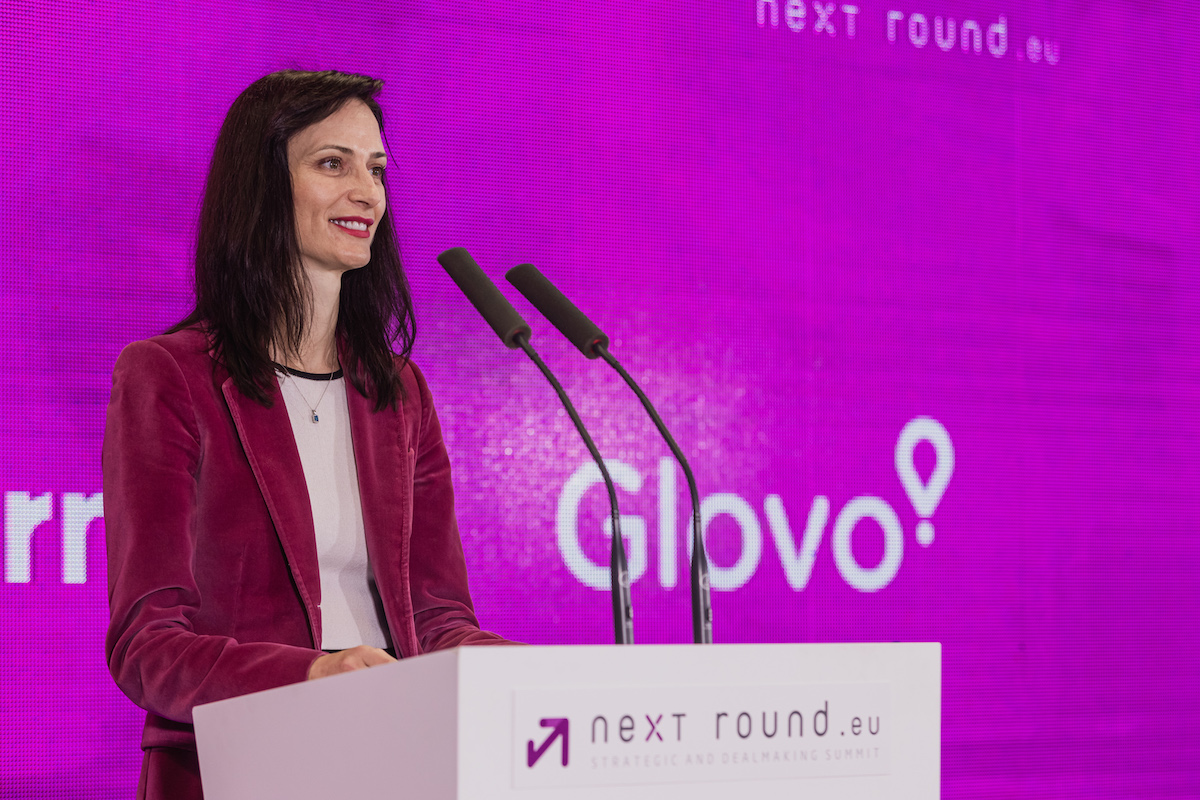
Mariya Gabriel, European Commissioner for Innovation
Europe's 6 key problems in the startup and scaleup ecosystem:
- Lack of innovation cohesion between the Member States and regions
- Lack of integration between local innovation systems in Europe
- Inefficient transfer of new technologies to the market
- Internal market fragmentation and regulatory barriers
- A business environment and culture that is less favourable to risk-taking and innovation
- Insufficient supply of venture capital to stimulate rapid business growth
The importance of startups and scaleups is also recognised in Slovenia
In 2017, Slovenia, with the help of the startup community, already identified and outlined key challenges and proposed solutions to improve the business environment for startups and scaleups in the government's Action Plan "Slovenia, the Land of Startups". In September 2021, the Ministry of Economic Development and Technology invited 25 representatives of the Slovenian startup community to revise and upgrade the Action Plan. The Slovenian Government also recognises the importance of innovative startups and scaleups for the economic and social progress of Slovenia and the EU, as highlighted by the Minister of Economic Development and Technology, Zdravko Počivalšek, in his opening speech, who said: "These are the companies that develop breakthrough innovations, respond quickly to real-world needs, create new jobs, and integrate with traditional industrial companies." The Minister believes that startups and scale-ups are the ones that will play a key role in the economic recovery and that it is necessary to increase investment in R&D, promote the green economy, digitisation, the use of new technologies, deep tech and innovation.
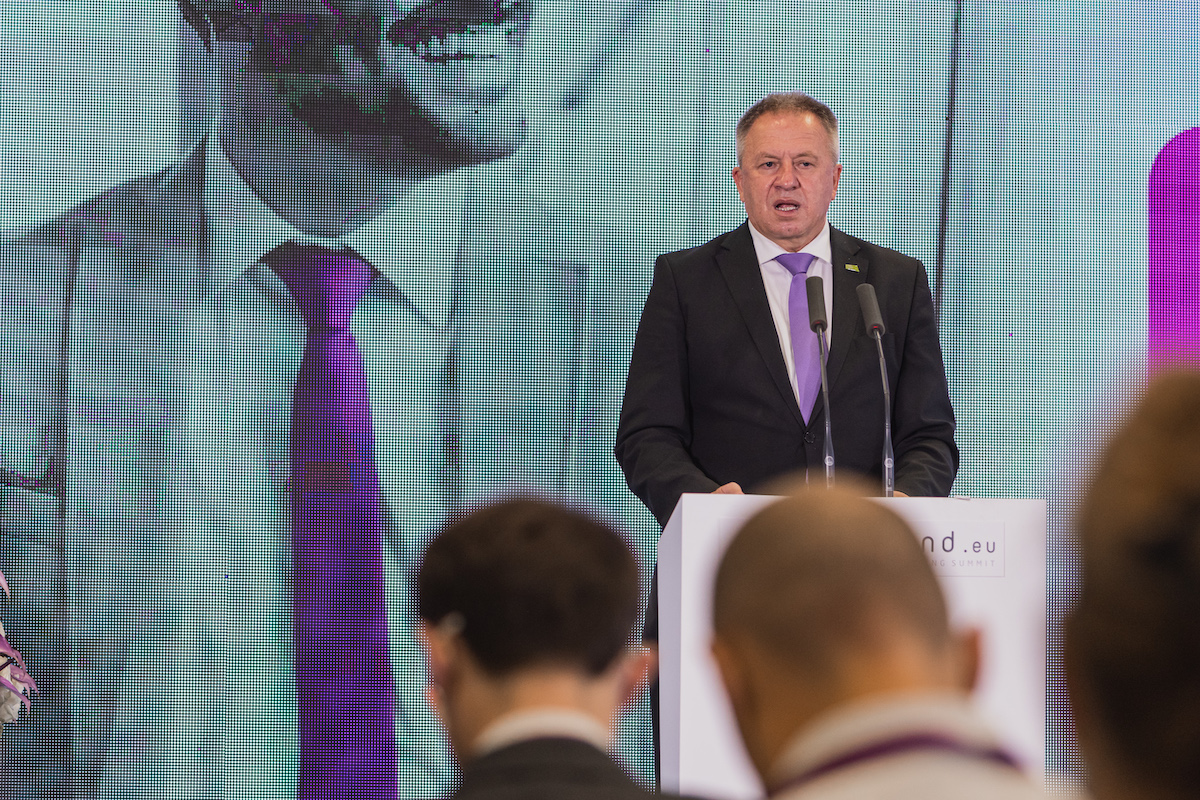
Zdravko Počivalšek, Minister of Economic Development and Technology,
Entrepreneurs' challenges at the centre of discussions at the Next Round
At the conference, high-level representatives from the European Commission, individual EU Member States and Slovenia had the opportunity to listen to the challenges of successful Slovenian startup and scaleup entrepreneurs who are achieving international success. The following entrepreneurs presented themselves to the NextRound participants:
- Matej Biček, Elaphe
- Matej Štefančič, Efos
- Jaro Žiraj, Simarine
- Jakob Šušterič, Mesi
- Borut Čeh, Labena
- Marko Rant, Borza terjatev-Invoice Exchange
- Luka Sinček, Bevo
- Vid Peterman, Modri planet
- Enej Kuščer, Acies BIO
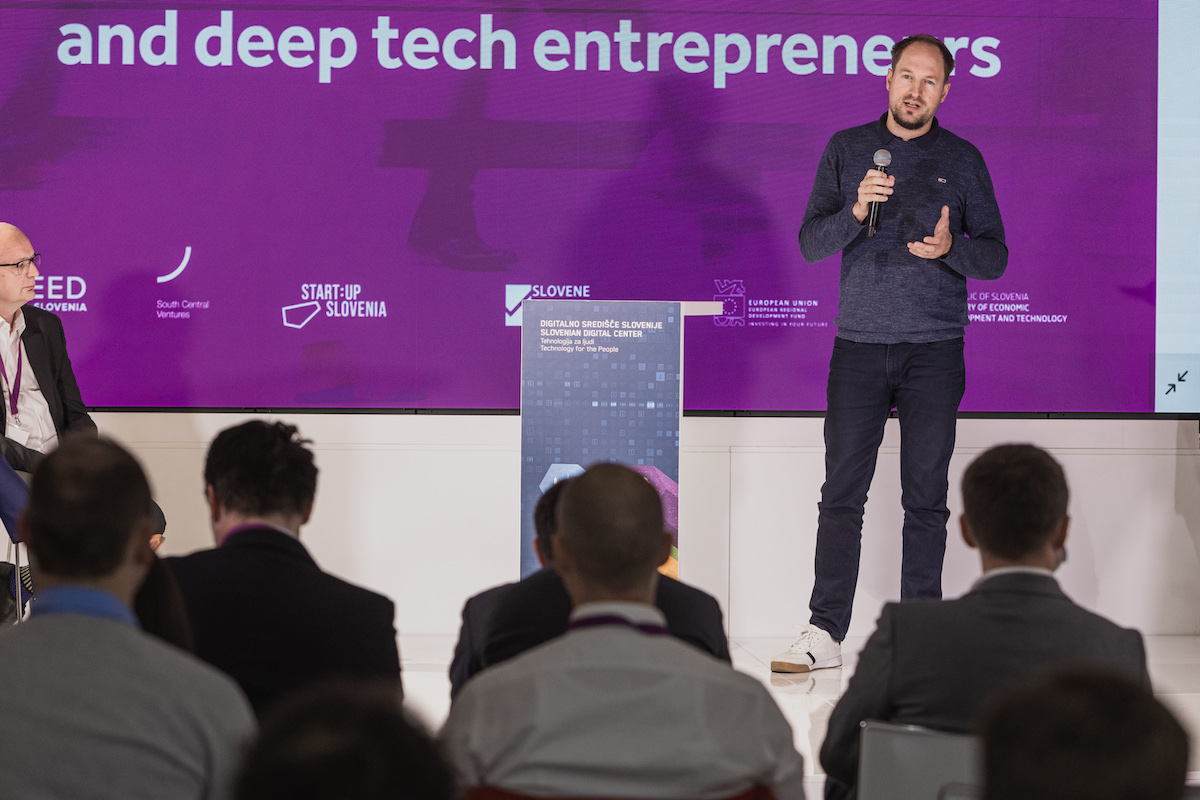
Jaro Žuraj from Simarine
Entrepreneurs presented their business and successes and highlighted the challenges they faced on their way. Quite a few highlighted the problem of early-stage financing and the problem of recruiting the right staff.
Lack of venture capital resources calls for action
Although the amount of money invested in European companies has increased steadily over the last decade, Europe lags far behind North America and Asia. This was also highlighted by the French Secretary of State, Cédric O, who pointed to two of the most important challenges facing the European Union: funding and talent. There is a need to attract more foreign money and more domestic money, because we are in a situation where Europeans are saving and Americans are not, and this will, in turn, boost American companies. We also need to make an effort to retain talent and to create an environment that will make them want to stay and come to Europe.
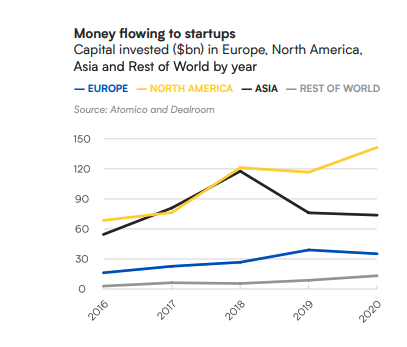
(Vir: Scale-up Europe, str. 11)
He also added:
“The crisis is a moment when we have a unique opportunity to reset, but only if companies and talent see what they need to do in the future. Now is the time to invest and build ecosystems, because this opportunity won't come again.”
The new 70 million SEF fund is the answer to a key weakness of the ecosystem
It was in the light of these challenges that it was good to hear the news that Slovenia is also planning to strengthen access to venture capital, with the Slovene Enterprise Fund's plan to launch a new €70 million fund in cooperation with the EIF. This is to respond to the challenges of companies, and they plan to further strengthen the content support in the area of connecting with global innovation hubs, such as startup and scaleup houses, and to strengthen the promotion of venture capital investing.
See what Eric Montgolfier, Managing Director of Invest Europe, who was actively involved in the preparation of Scale-up Europe, advises startups to close the funding gap.
Startup and Scaleup Traffic Light well received
The Ministry of Economic Development and Technology has introduced the Startup and Scaleup Traffic Light in 2021, which was presented in more detail at the conference by Jernej Salecl, Director General at the Directorate for Internationalisation, Entrepreneurship and Technology. He presented a new methodological tool that was developed to review key actions to improve the business environment for startups and scaleups and to measure progress on a country-by-country basis. Salecl pointed out that, "We want to contribute to a more transparent monitoring of the progress of the business environment, to the international exchange of experiences and good practices and to a healthy 'competition', all implemented by European and national institutions with the aim of faster growth of start-ups and scale-ups."
The tool also makes it easier to see what has been done so far to improve the startup and scale-up business environment and what countries' plans are for the future. Simon Zajc, State Secretary at the Ministry of Economic Development and Technology, stresses that the Traffic Light is not used to show which country is better or worse but to show where work still needs to be done. It has shown that countries' biggest problems are in attracting investors, so the focus should be on attracting institutional investors who will see startups and scaleups as a great investment opportunity. There is also the problem of retaining and attracting talent to Europe. The tool found that a third of countries have already introduced some kind of a tech visa, a third are planning to do so and a third are not yet considering it. A tech visa would facilitate migration and attract talent. They also encountered problems with taxation, with 50% of countries not even addressing this issue yet.
Simon Zajc pointed out:
“It's a tool that has made us aware of many things."
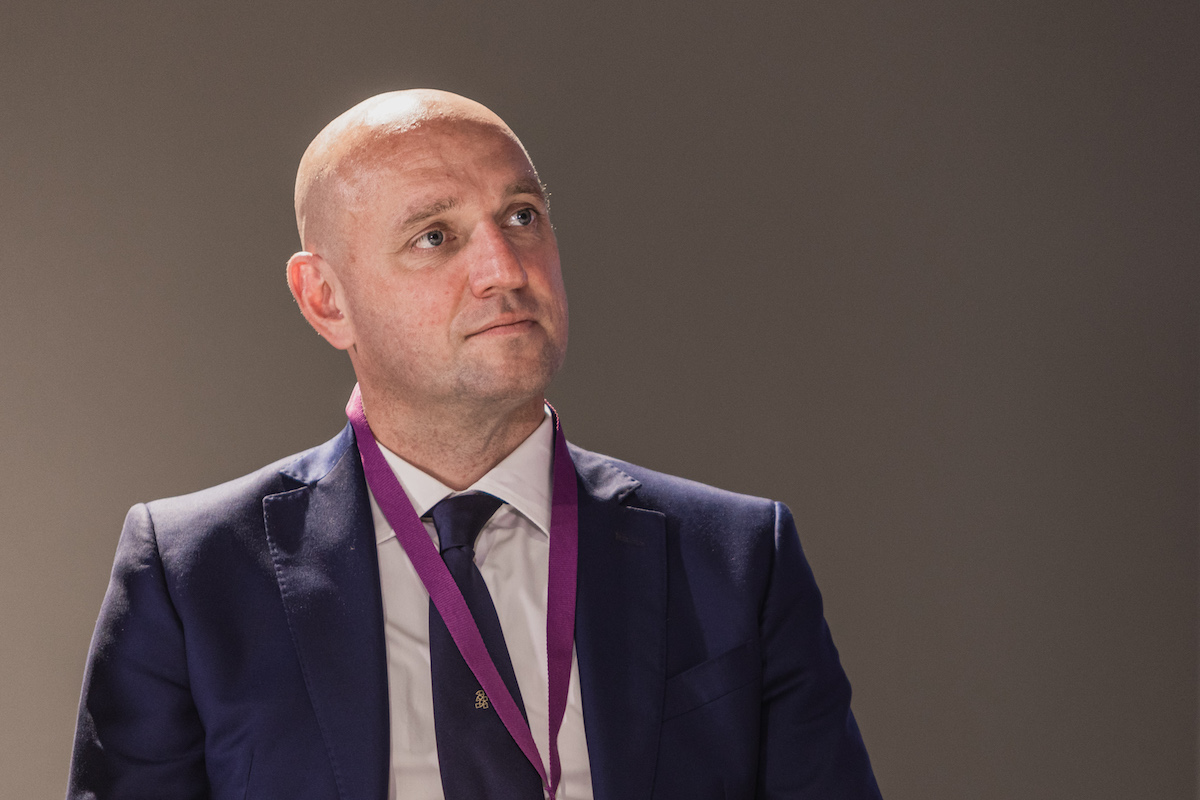
Simon Zajc, State Secretary
Watch the video below to find out why the Traffic Light is such a useful tool. Find out more from Jan Bormans, Managing Director of European Startup Network, who is one of the key players who helped create it.
Jan Bormans added:
“It is important to have different stakeholders to challenge the findings of the traffic light.”
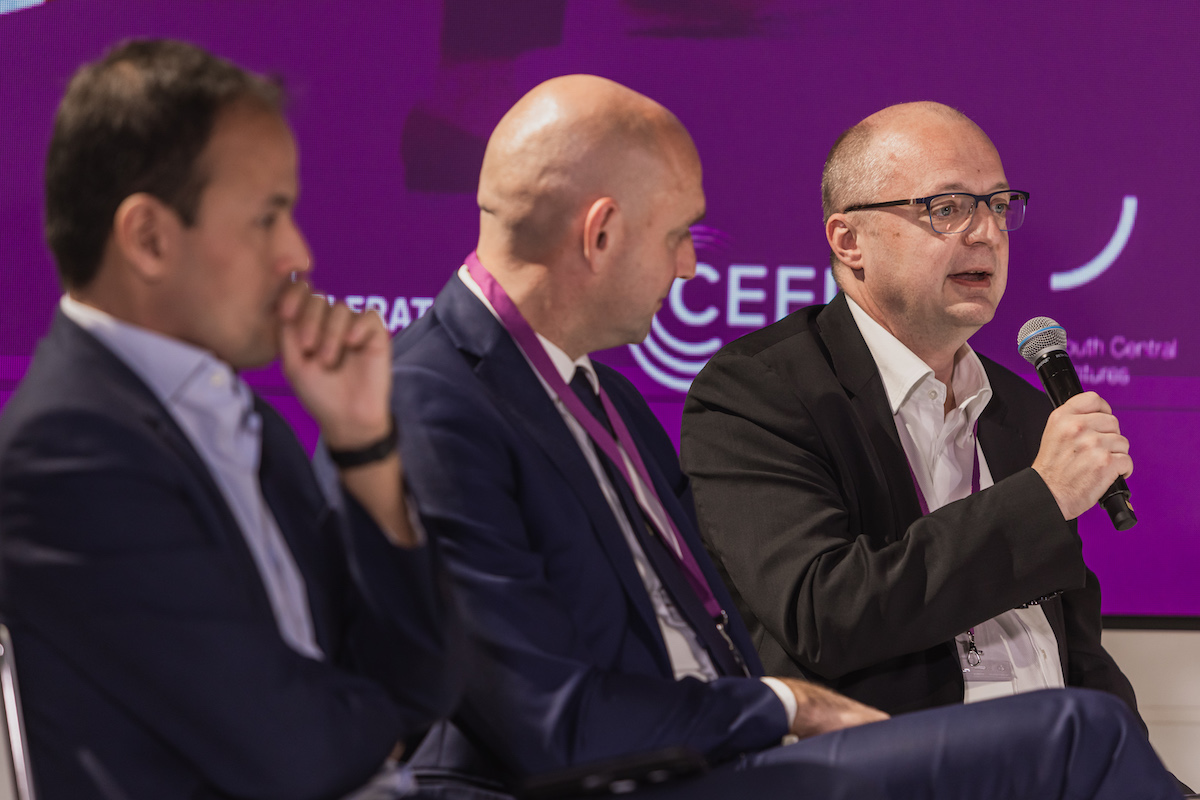
Cedric O, Simon Zajc and Jan Bormans
The tool is based on key strategic European and national documents that address the issue of improving the business environment for startups and scaleups, namely:
- Startup Nation Declaration
- Action Plan to Make Europe the new Global Powerhouse for Start-ups
- #NextInnovationEU
- Scaleup Europe
- FR non paper – European support agenda for scale-ups
These documents list more than 100 recommendations from different areas of the business environment. The Ministry of Economic Development and Technology, in cooperation with experts, pursued the objective of identifying a manageable number of key actions that are necessary to improve the business environment and could potentially have the greatest short and medium-term impact on accelerating the creation and growth of startups and scaleups. 11 key actions were selected, grouped into 5 priority areas, namely:
- Access to finance
Talent and mobility
Fostering "deep tech"
Collaboration with corporates
Legislation, tax and access to information
An effective tool for action planning
Eleven countries, including Slovenia, have so far provided data for the Startup and Scaleup Traffic Light. It will reach its full potential at the end of the year when data from all EU Member States will be available.
Each European country completes the Traffic Light by assessing the current state of the business environment in the country and the actions that will contribute to it. In doing so, green means that the measure is already implemented, orange if it is under implementation and red if the measure is not planned. Each needs to be explained accordingly.
According to Jernej Salecl, the Ministry of Economic Development and Technology will carefully compare the results across countries and try to identify good practices that could be implemented in Slovenia. He also announced that the tool will also be used by all other EU Member States, which are increasingly striving to improve the business environment for startups and scaleups and have welcomed and supported Slovenia's initiative in setting up the Startup and Scaleup Traffic Light. Jernej Salecl expects that the greatest added value will be in those areas that are the hardest nut to crack when it comes to implementing change, but which, on the other hand, could have the greatest positive impact on the development of this propulsive sector, such as the challenges related to changing tax legislation. In this respect, he believes that Europe can become a “powerhouse of deep tech startups, scaleups and innovators”, as set out by Europe's leading entrepreneurs and innovators in the aforementioned Action Plan.
ERA & Innovation Director Anna Panagopoulou stressed that the Startup and Scaleup Traffic Light is a fantastic tool to help all participants and EU Member States understand how the different Member States work in the context of innovation and the actions they are taking. It is a tool that helps to share knowledge, experiences and fosters cooperation to overcome problems. In this context, Ms Pannagopolou added that several areas have been reported as being well implemented by the countries that have already participated in the Traffic Light. One of these areas is the promotion of women in entrepreneurship, which is a very big step forward. Digital transformation in public administrations is also an area where the Member States are actively working. There are still areas where countries need to work actively, for example, funding innovation alone is no longer enough.
Bernardo Calzadilla, Director of UNIDA, said that he sees the development of the Traffic Light as a successful tool for industrial policymaking, in particular, to support SMEs, startups, scaleups, incubators and accelerators. Now, more than ever is the moment to build an innovation ecosystem and a strong infrastructure.
Is there a recipe for becoming a unicorn?
The CSO of the first Romanian unicorn UiPath, Vargha Moayed, also took part in the discussion on how to improve the business environment and what needs to be done. UiPath is the latest Eurotech star to manage a public listing in America, as highlighted by the Scale-up Europe report. Vargha stressed that the Traffic Light is a good tool in terms of ease of use, but warned that we should not fall in love with the metrics and forget that we need to take action to change things.
Given the success of UiPath, we asked Varga at the conference what is the secret recipe to becoming a unicorn.
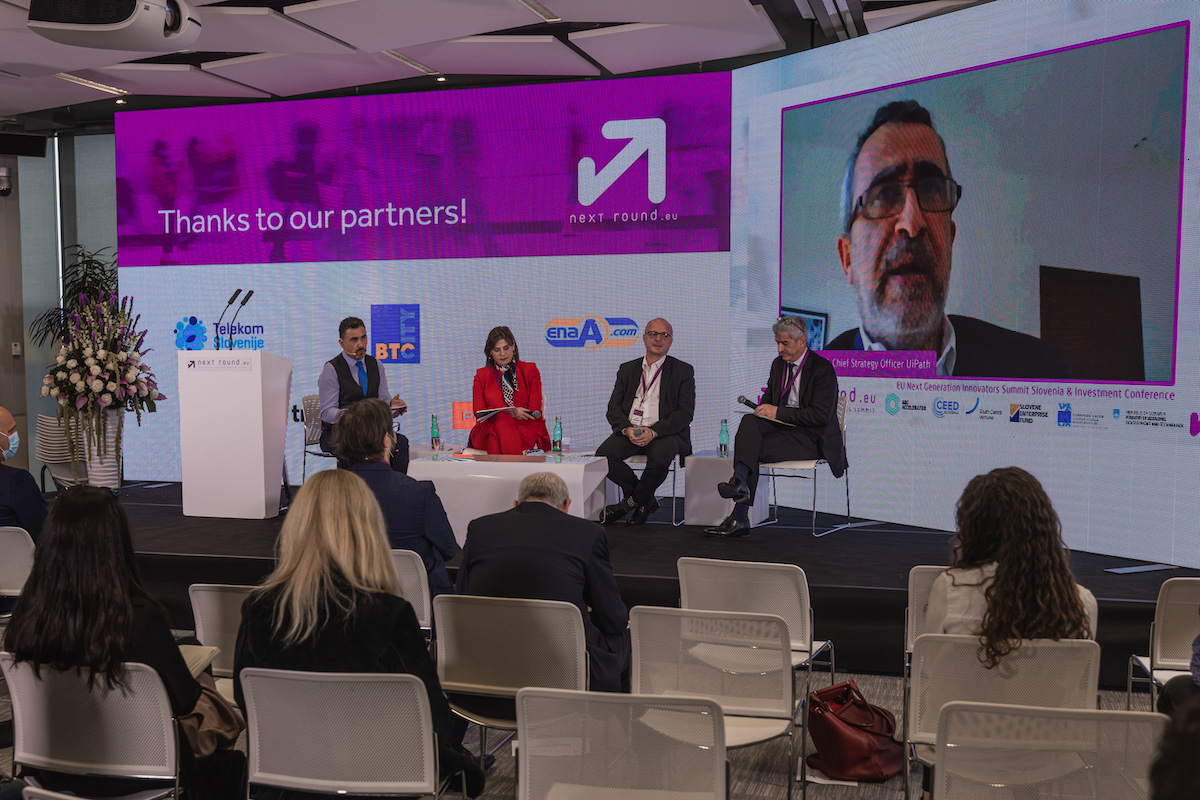
Director of 'ERA & Innovation' Anna Panagopoulou, Director of ESN Jan Bormans, Director of Invest Europe Eric de Montgolfier, CSO of UiPath Vargha Moayed
Vargha replied:
"You have to be very careful with recipes because there isn’t one. Every company finds itself in different circumstances, so it can be very open to the circumstances it finds itself in. One of the most important things for us was definitely good timing. But values were also very important for us. Our actions were driven by two main values, humility and boldness."
Next Round 2021 Conference
The international Next Round conference was held in cooperation with the Slovene Enterprise Fund, ABC Accelerator and South Central Ventures as part of the Startup Plus programme. This year it took place on 26-27 October at the Crystal Palace at Digital Centre Slovenia. The event was attended by major venture capital investors from the EU and beyond, interested in investing in the CEE regions.
Many great Startup Plus programmes
The Slovene Enterprise Fund also organises a number of other excellent entrepreneurial programmes for portfolio companies, such as the push2start accelerator programme, Startup Clinic, SK GROWTH CAMP, NextRound, GROWdigital, KorpoStart, INTL, Nextround, School for Investors, HardwareSTART, CEED Founders Talk and ScaleUPgrade. The content programmes effectively complement the financial products P2, SK75 and SI-SK, which provide Slovenian start-ups with between EUR 54,000 and EUR 600,000 in start-up funding.
###
Content support for recipients of P2, SK75 or SI-SK financial products under the "de minimis" scheme is co-financed from the Slovene Enterprise Fund and the European Union from the European Regional Development Fund. This is implemented on the basis of the Content Support for Funds Recipients (SMEs) Programme in the 2018-2023 period, under the Operational Programme for the Implementation of the European Cohesion Policy 2014-2020.
.png)



